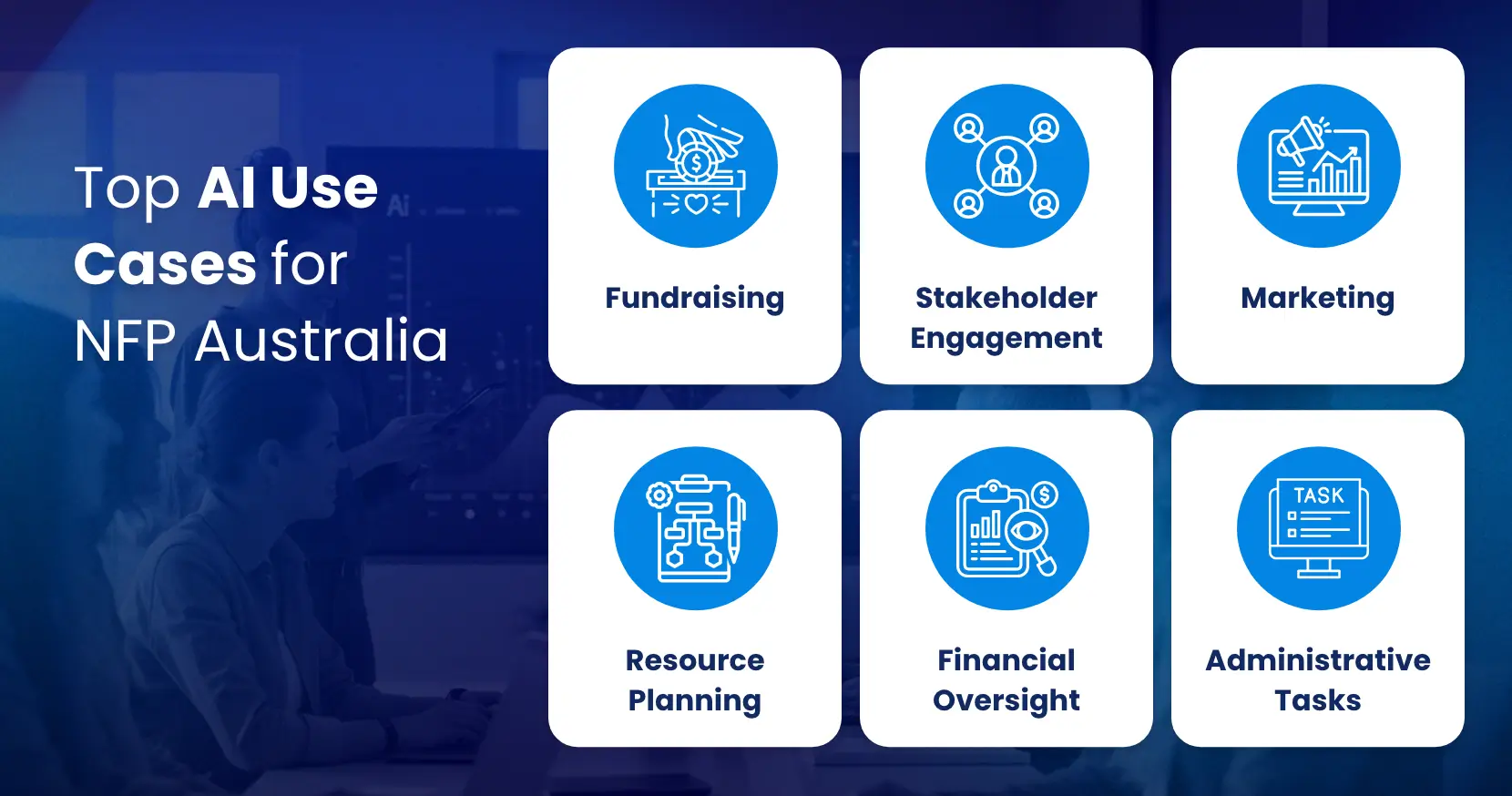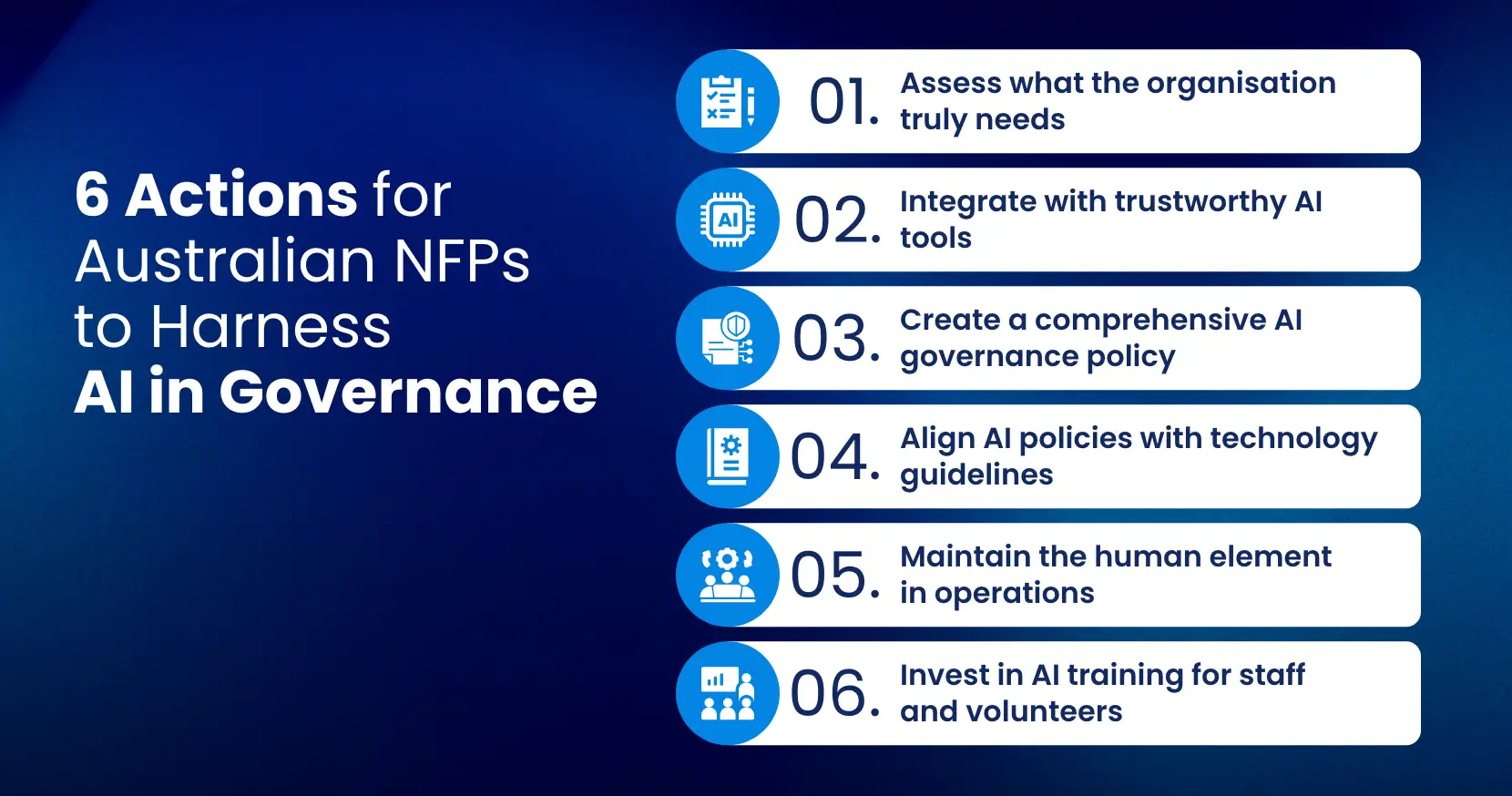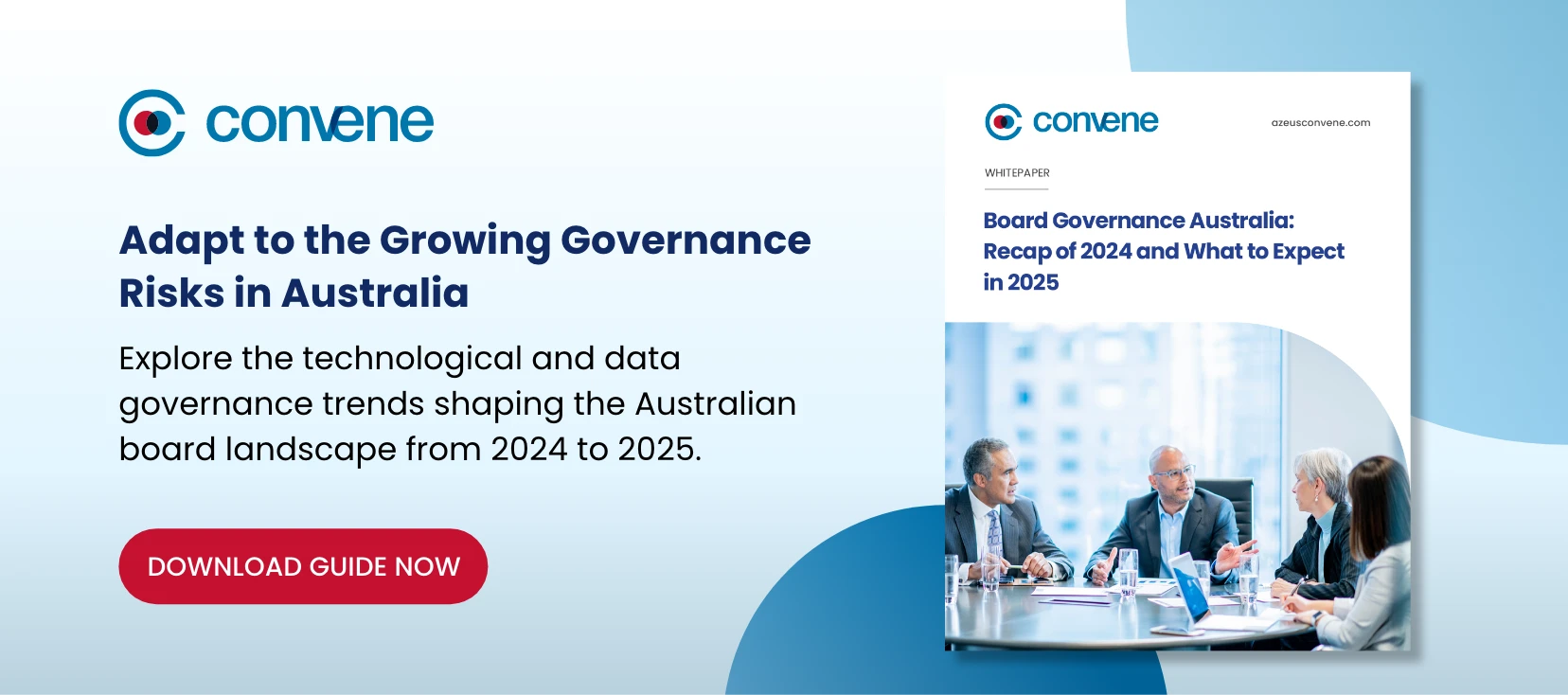Today, corporations are not the only ones leveraging AI — it’s empowering not-for-profits (NFPs) to innovate and amplify their impact like never before.
According to a survey by TechSoup, a not-for-profit focused on digital transformation with over 50 global partners, the sector is seeing a steady increase in AI adoption. Out of the 1,321 NFP professionals surveyed worldwide, 42% said that one or two people were driving AI exploration in their organisation, while 24% were proactive in integrating it into operations. With this growing interest, AI has become a critical tool for charitable organisations to scale their mission-driven work.
In Australia, NFPs are following this global trend, exploring AI to enhance workflows, improve fundraising strategies, and make smarter decisions. This guide explores the extent of AI adoption among Australian NFPs, the benefits, and practical use cases it offers. Additionally, understand the key inherent challenges associated with AI Australia, along with actionable steps to ensure responsible use.
How is AI shaping the landscape of NFPs in Australia?
As AI continues to evolve, the NFP Australia sector, from education to healthcare, takes this opportunity to balance its transformative benefits with inherent risks, particularly in terms of data privacy, service quality, and legal compliance.
In 2023, many organisations in NFP Australia and New Zealand were hesitant to embrace generative AI; however, in a span of one year, usage surged from 24% to 76%. Pushing innovation even further, around 3% have deployed their own AI chatbots to deliver more personalised customer experiences.
Among the first to build their own chatbot is Australia’s Aged Care Quality and Safety Commission. They collaborated with NeonCarrot to test Retrieval-Augmented Generation (RAG) for its knowledge base. The result? Streamlined document access, reduced manual searches, and ensured consistent information for aged care providers.
The sector is also showing interest in machine learning, with 21% already researching its potential for managing and manipulating organisational data. Recently, Greenpeace AU, a leading environmental NFP, partnered with Dataro to improve the ROI of their regular giving programmes.
Using machine learning, Dataro’s tool identified the most “at-risk” donors — those who’d likely miss three consecutive donations over the next six months. The AI-generated list increased Greenpeace AU’s net revenue by 12.7% and helped them secure their largest single gift to date.
Why should not-for-profits prioritise AI Australia?
With the demand AI is getting today, prioritising it is no longer optional. NFPs are compelled to adapt to unlock new growth potential and enhance competitiveness. Explore in this section the top reasons driving AI integration in the sector.
Translate data into clear growth strategies
Before AI, NFP boards struggled to translate data into actionable insights. In fact, 37% of organisational leaders ranked data and reporting as their top priority in 2025. With AI, they are now better equipped to investigate donor behaviours in detail, as it breaks down barriers between data collection and analysis.
Predictive AI enables them to build interactive dashboards that simplify what was once a multi-step process of evaluating historical data. Using its algorithms, NFPs can uncover patterns and create forecasts with greater precision, which allows them to craft effective fundraising strategies.
Reduce the complexity of operations
Running a charitable organisation involves constant administrative work and strategic planning. By automating repetitive work using AI, not-for-profits in Australia can eliminate operational bottlenecks, freeing up staff time to focus more on mission-critical activities.
Accelerate decision-making with real-time insights
Through its powerful capability of turning raw data into actionable insights, AI replaces static reports with a more dynamic reporting structure. AI tools for NFP Australia typically have built-in alerts and recommendations that NFPs can configure to meet their unique needs. Instead of waiting for periodic, lengthy board papers, AI provides real-time data that teams can act on immediately, enhancing responsiveness and agility.
Top AI Use Cases for NFP Australia

Australian not-for-profits often face resource constraints while striving for maximum impact. To deepen understanding of how AI transforms charitable organisations, here are real-world applications that demonstrate how this technology can amplify social impact.
1. Fundraising
Machine learning continues to gain recognition from Australian NFPs as a tool to achieve data-driven fundraising campaigns. These algorithms are useful for analysing massive datasets on donor behaviour, particularly on donor frequency and amount, to identify the most valuable donors.
Building on this potential, NFPs are now leveraging AI to personalise donor engagement. For example, Dataro explained the goal of their partnership with Greenpeace AU, saying: “Instead of treating donors like a segment, AI helps nonprofits treat donors like individuals. It also helps fundraisers to understand donors better and develop very accurate ideas about what each individual donor is likely to be interested in and what types of campaigns or asks they are most likely to be receptive to.”
2. Stakeholder Engagement
One of the most widely adopted AI tools among NFPs is chatbots. These virtual assistants provide real-time assistance to donors, beneficiaries, or volunteers to ensure information is accessible and immediate. Chatbots are trained to process high volumes of information and automate responses to repetitive inquiries, allowing representatives to focus on more high-value conversations.
3. Marketing
AI empowers NFP Australia to have a faster turnaround with its marketing efforts. Generative AI helps produce written material and images in seconds, while AI-driven platforms centralise management over email marketing and social media management.
The same survey by Infoxchange affirmed these use cases when it found that 76% of staff use AI tools for drafting emails, brainstorming, and content creation. With both Gen AI and AI platforms in NFP’s AI toolkit, teams can streamline their marketing processes from conceptualisation to execution.
4. Resource Planning
AI provides NFPs with visibility to allocate resources where they’ll make the greatest impact. Predictive analysis allows organisations to forecast resource needs by identifying patterns in resource availability, beneficiary demographics, and community trends. This enables teams to pinpoint priority areas and adapt more effectively to the evolving needs of their communities.
Internally, predictive analysis is also valuable for skills matching. AI helps map skills and matches them with project requirements to connect staff and volunteers with initiatives that align with their expertise. This maximises effectiveness, reduces burnout, and ultimately, drives better outcomes for communities and teams.
5. Financial Oversight
According to the 3rd Annual Not-for-profit CEO Survey by PwC Australia, talent shortage is something that NFPs deal with most of the time, and this time, they are trying to fill gaps with AI. They are finding value in AI-driven finance software to replicate efficiency similar to that of humans or, if not, achieve greater.
With AI, they can extract and validate invoice data and automate invoice matching, enabling them to flag anomalies in real-time. The software also has streamlined approval processes that save time when producing annual financial statements.
6. Administrative Tasks
NFPS must maximise their time to have a greater impact in their communities. AI helps them automate recurring administrative tasks, reallocating time for staff to focus on more important activities. AI tools are useful for scheduling meetings, transcribing discussions, automating notifications, and organising digital documents.
For NFP boards, AI-powered board management software is now transforming how directors collaborate. The emergence of AI assistants and summarisation tools provides an instant breakdown of meetings and lengthy board papers that facilitates faster decision-making.
What are the key challenges of implementing AI in Australian NFPs?
True enough, AI offers multiple benefits that help NFPs further their charitable cause. However, its positive impact is only as good as its repercussions. AI integration exposes them to a multitude of risks that, if not handled well, can erode trust and damage reputation.
The primary challenges of implementing AI among NFPs include:
Data privacy and security risks
The rapidly scaling use of AI creates unprecedented data privacy issues among NFPs. While AI is proven reliable to process big data, oftentimes, it’s not transparent about how it handles and stores it. The same goes for generative AI, which are tools prone to reproducing sensitive information of their communities and donors and misrepresenting them.
A recent survey highlights this growing concern, stating that 56% of NFP leaders are concerned about data protection and privacy issues. In a sector where trust is currency, NFPs see this as a big challenge that can undermine funding and community support.
Related Read: Cyber Attacks in Australia: An Action Plan for Boards
AI hallucinations and bias considerations
AI isn’t guaranteed to work accurately at all times. Without robust training and data governance, AI-driven software is vulnerable to hallucinations, causing it to produce false or misleading information. In 2023, Hepburn Shire Council Mayor Brian Hood filed a defamation case against OpenAI after it falsely claimed his involvement in a foreign bribery scandal. Additionally, these hallucinations may reinforce existing biases about communities or individuals, affecting the quality of decisions.
Loss of human touch
AI must enhance process and decision-making and should not replace humans, especially in the NFP sector, where empathy and personal connection are critical. Overreliance on AI could become a problem over time, potentially replacing staff or diminishing their roles, leading initiatives to lose resonance and genuine human impact.
Widening digital divide
AI integration can widen the digital divide for those with limited access to technology or poor technical literacy, whether among staff, communities, volunteers, or donors. This may impact how NFPs engage with stakeholders, leading to disengagement, weakened relationships, and even loss of trust.
Stakeholder resistance
Some donors are vocal in expressing their resistance to AI, mainly due to concerns mentioned above. The challenge for NFPs is to gain their trust by establishing open communication and demonstrating responsible AI practices. Donors must fully understand the purpose of AI in advancing your NFP’s mission.
6 Actions Australian NFPs Should Take to Harness AI for Better Governance
 AI is transformative, but only when NFPs are grounded in a strong foundation. To succeed with deployment, they need to overhaul their processes for better data quality, integrated systems, and dynamic reporting.
AI is transformative, but only when NFPs are grounded in a strong foundation. To succeed with deployment, they need to overhaul their processes for better data quality, integrated systems, and dynamic reporting.
How can Australian NFPs ensure they have reliable and effective AI systems? Here’s what to do to achieve a holistic AI governance framework.
1. Assess what the organisation truly needs
Before committing to AI adoption, NFP boards should take time to assess the exact pain points where AI can deliver value. The more specific, the better — whether reducing administrative workload, improving donor engagement, or enhancing service delivery.
From there, it’s also crucial to assess the overall system readiness, team capability, and operational fit. Identifying this early on prevents wrong investment decisions and allows boards to set clear success metrics.
2. Integrate with trustworthy AI tools
With the plethora of AI tools on the market, you must be thorough in finding the best tool for your NFP. Start by identifying the capabilities or solutions you need, whether you need generative AI or predictive AI. Afterwards, it’s easier to participate in demos and evaluate every tool in your prospect list.
For centralised oversight on AI implementation, boards can explore AI-powered board portals for NPs. They are secure digital platforms that consolidate communication, document management, meeting preparations, and compliance in one single view. These platforms are equipped with AI tools that provide boards with automated workflows and real-time actionable insights for more informed decision-making.
3. Create a comprehensive AI governance policy
Plan ahead for AI risks and implementation concerns by developing an AI governance policy. This framework guides teams in the proper use of AI, enabling them to make ethical decisions, protect data, and comply with transparency requirements.
In Australia, NFPs are not yet subject to following a formal regulatory framework for AI. However, they are encouraged to uphold the following to ensure responsible AI use:
ACNC Governance Standard 5
Charities should consider the impact of AI on their governance or registration obligations. To retain good standing under Australian governance requirements, they must incorporate Governance Standard 5 into their AI initiatives. Duties and responsibilities under this standard include:
- Managing people’s information and data with reasonable care and diligence.
- Upholding transparent and accountable financial practices to safeguard resources and donor trust.
- Act with honesty and fairness in the best interests of the charity and its charitable purposes.
AI Ethics Principles
Application of AI Ethics Principles is voluntary but highly encouraged to foster ethical use of AI systems among businesses and not-for-profits Australia. AI may have different impacts based on varying use cases and levels of integration, so it’s crucial for NFPs to evaluate these first before implementation.
According to the Australian Government, charitable organisations must first answer these threshold questions to identify if these principles are applicable.
- “Will the AI system you are developing or implementing be used to make decisions or in other ways have a significant impact (positive or negative) on people (including marginalised groups), the environment, or society?”
- “Are you unsure about how the AI system may impact your organisation or your customers/clients?”
At a glance, the eight AI ethics principles of Australia include guidelines on:
- Human, societal, and environmental well-being
- Human-centred values
- Fairness
- Privacy protection and security
- Reliability and safety
- Transparency and explainability
- Contestability
- Accountability
4. Align AI policies with technology guidelines
Ensure your AI policy handbook complements technology guidelines — a compilation of IT protocols and operational procedures that guide teams on digital transformation, maintenance, and risk management. NFPs should revisit their policies before integrating AI tools into existing systems.
It’s recommended to:
- Implement permission controls to avoid unauthorised access and data leaks.
- Utilise security features such as data encryption for file sharing and multi-factor authentication for software logins.
- Check systems regularly to strengthen resilience against hackers.
5. Maintain the human element in operations
NFPs must be intentional about preserving genuine human relationships as AI becomes more deeply integrated into operations. AI can enhance workflows, but it can’t replicate the same level of empathy, cultural understanding, and ethical judgment that humans possess — all of which are key factors that build donor trust in organisations and encourage contributions.
The same goes for communities and volunteers. For these connections to thrive, they need authentic, person-to-person engagement to foster mutual respect and reinforce shared values.
6. Invest in AI training for staff and volunteers
Provide training to staff and volunteers to ensure they can use tools effectively and responsibly. This includes AI literacy training, role-specific AI skills development, and AI tool onboarding. To keep high engagement during training, it’s important to explore various methods such as workshops, online courses, and mentorship programmes.
Empower Your NFP Board with AI-Driven Governance

As AI Australia gains momentum, boards are given a unique opportunity to lead transformation with the right digital tools. Now is the time to take proactive steps toward modern not-for-profit governance — where decisions are faster, data is clearer, and collaboration is more secure.
Meet Convene, an AI-powered board portal designed to support smarter, more seamless governance for NFPs. For our Australian NFP clients, Accordwest and Compassion Australia, Convene board portal has proven to be a powerful tool for streamlining key board processes while maintaining top-notch security for confidential information at all times.
According to Accordwest CEO Ivan Nuun: “By utilising its full suite of features, we’ve streamlined document management, strengthened security, and improved the accessibility of board materials to our busy board directors and associate members.”
Now integrated with AI features such as the AI Companion and Automated Meeting Summaries, the Convene board portal takes out the burden of minute-taking and manual file reviews. These provide directors instant insights that empower them to make strategic decisions with confidence.
Book a Convene board portal demo today and discover how an AI-driven platform can transform your board’s efficiency and governance practices.
Jean is a Content Marketing Specialist at Convene, with over four years of experience driving brand authority and influence growth through effective B2B content strategies. Eager to deliver impactful results, Jean is a data-driven marketer who combines creativity with analytics. In her downtime, Jean relaxes by watching documentaries and mystery thrillers.





